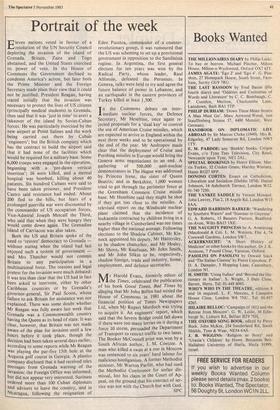Portrait of the week
leven nations voted in favour of a resolution of the UN Security Council deploring the invasion of the island of Grenada. Britain, Zaire and Togo abstained, and the United States exercised its power of veto. In the House of Commons the Government declined to condemn America's action, but later both the Prime Minister and the Foreign Secretary made plain their view that it could not be justified. President Reagan, having stated initially that the invasion was necessary to protect the lives of US citizens (principally medical students) in Grenada, then said that it was 'just in time' to avert a takeover of the island by Soviet.Cuban forces. He was particularly exercised by the new airport at Point Salines and the work being carried out there by Cubin 'engineers'; but the British company which has the contract to build the airport said that it had none of the facilities which would be required for a military base. Some 6,000 troops were engaged in the operation, beginning with a 'pre-dawn vertical insertion'; 16 were killed, and a mental hospital was bombed, killing about 40 patients. Six hundred Cubans were said to have been taken prisoner, and President Castro said resistance had ended. About 200 fled to the hills, but fears of a prolonged guerrilla war were discounted by the commander of US occupation forces, Vice-Admiral Joseph Metcalf the Third, who said that when they were hungry they would come down again. The Grenadine island of Carriacou was also taken.
Both the US and Britain spoke of the need to 'restore' democracy to Grenada without stating when the island had last enjoyed such a system of government and Mrs Thatcher would not commit Britain to any participation in a multinational force. The reasons and legal pretext for the invasion were much debated: it was less than clear that the US had in fact been asked to intervene, either by other Caribbean countries or by Grenada's governor-general, Sir Paul Scoon, whose failure to ask Britain for assistance was not explained. There was some doubt whether Mr Reagan was fully aware last week that Grenada was a Commonwealth country having the Queen as its head of state. It was clear, however, that Britain was not made aware of the plan for invasion until a few hours before it took place, though the decision had been taken several days earlier, according to some reports while Mr Reagan was playing the par-five 13th hole at the Augusta golf course in Georgia. A plastics company disclosed that it had received telex messages from Grenada warning of the invasion: the Foreign Office was informed, but did not appear very interested. Surinam ordered more than 100 Cuban diplomats and advisers to leave the country, and in Nicaragua, following the resignation of Eden Pastora, commander of a counter- revolutionary group, it was rumoured that the US was scheming to set up a provisional government in opposition to the Sandinista regime. in Argentina, the first general election for ten years was won by the Radical Party, whose leader, Raul Alfonsin, defeated the Peronists. In Geneva, talks were held to try and agree the future balance of power in Lebanon; and an earthquake in the eastern provinces of Turkey killed at least 1,500.
Ithe Commons debate on inter- mediate mediate nuclear forces, the Defence Secretary, Mr Heseltine, once again re- jected proposals for a 'dual key' to control the use of American Cruise missiles, which are expected to arrive in England within the next three weeks and to be operational by the end of the year. Mr Andropov made clear that the deployment of Cruise and Pershing missiles in Europe would bring the Geneva arms negotiations to an end. A gathering of 500,000 anti-nuclear demonstrators in The Hague was addressed by Princess Irene, the sister of Queen Beatrix; and in Berkshire, 1,000 women tried to get through the perimeter fence at the Greenham Common Cruise missile base. Mr Heseltine said they might be shot if they got too close to the missiles. A televised report on the Windscale nuclear plant claimed that the incidence of leukaemia contracted by children living in a nearby village in Cumberland was ten times higher than the national average. Following elections to the Shadow Cabinet, Mr Kin- nock appointed his deputy, Mr Hattersley, to be shadow chancellor, and Mr Healey, Mr Shore, Mr Kaufman, Mr John Smith, and Mr John Silkin to be, respectively, shadow foreign, trade and industry, home, employment, and defence secretaries.
Mr Harold Evans, formerly editor of the Times, celebrated the publication of his book Good Times, Bad Times by alleging that Mr John Biffen had misled the House of Commons in 1981 about the financial position of Times Newspapers Ltd, when Mr Rupert Murdoch was trying to acquire it. An engineers' report, which said that the Severn Bridge could fall down if there were too many lorries on it during a force 10 storm, persuaded the Department of Transport to restrict traffic to two lanes. The Booker McConnell prize was won by a South African author, .1. M. Coetzee. A man who killed a swan at a zoo in Moscow was sentenced to six years' hard labour for malicious hooliganism. A former Methodist minister, Mr Warton Parfitt, who had sued the Methodist Conference for unfair dis- missal, lost his claim in the Court of Ap- peal, on the ground that his contract of ser- vice was not with the Church but with God.
SPC














































 Previous page
Previous page